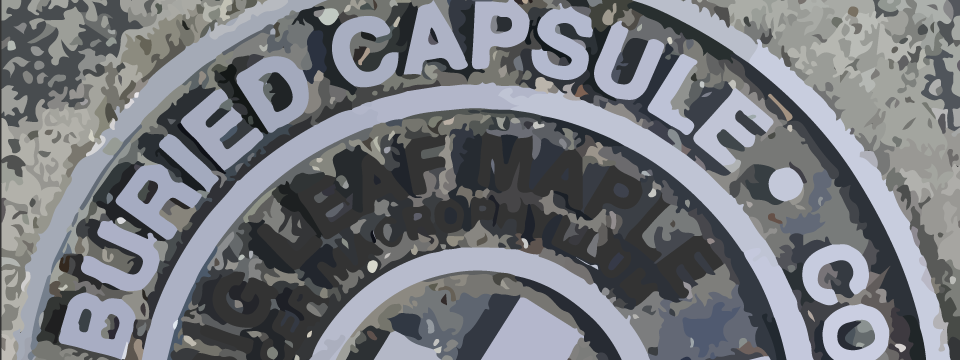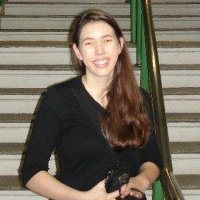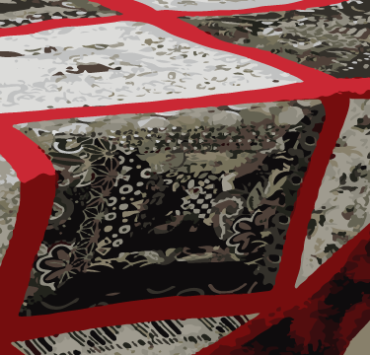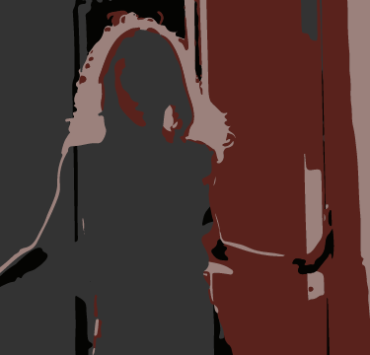
We buried the capsule in the backyard, a few inches under the ground. We were thirteen, an age that shivers indeterminate: you know nothing or you know everything. Still, Nana and I felt able to answer genuinely the questions about who we were then and what we would be in ten years. She wouldn’t trowel the dirt with me, and I didn’t much like the clay caking my fingers, but I dug by myself with her crouching nearby. Around her, I did things I wouldn’t normally do. “Look,” I said, “It’s not bad.” I pushed my fingers into the red Virginia dirt, and Nana let out a little noise, rubbing her hands together to signal the ickiness of it. We had our roles: she was reluctant, a little submissive, uncertain about her prospects in life. I was bustier, taller—my hair was straight brown to halfway down my back, where it softened into blonde. She knew I had done things with boys; I knew she hadn’t. Still, we had been drawn to one another in school, oddballs for different reasons: I often dressed in black, she barely ever spoke for shyness.
Burying the time capsule, I felt I didn’t have to see her answers to the questions to know them. They were folded into the smooth silver cylinder, the ends pushed together in a suction seal that wouldn’t be broken until we returned in a decade to unearth it. I thought something silly: “Everything about us is in here.” Even the nippy day, leaves detaching a little from the trees, the great expanse of my backyard, the pool and deck. I liked the house all right—it was big because my divorcée father was rich—but it was better with Nana standing there, both of us doing what we did best.
“That’s a worm,” she said, pointing.
“An earthworm,” I said, my hand moving that way.
“Do not touch it,” she said, one bare foot lifting. I could see the dark hairs on her legs where she hadn’t yet begun to shave, just above her knees. She had a soft, long body and a couple of large front teeth that she didn’t like to show. Her dark hair was always parted in the middle.
I kept on digging, leaving the earthworm to wriggle under sprays of dirt. I hoped my high school neighbor was watching. I knew my chest was moving under my blouse, and he could have seen from his window. Nana wasn’t really aware of him now, even though he had come by once during the summer, edging his way around the fence into the yard. We were in our suits by the pool, and my brother had just scratched Nana’s arm; he waved an awkward hand as she crossed the deck to go inside for a band-aid. He came and stood in front of the sun, a shadow over my reclining chair. “Christina,” he said, too formal. He was always too formal, but he was dirty blonde and floppy-hair cute. We flirted a little; I touched my chest to rub an itch, a really powerful itch, until Nana came back outside, her purple one-piece camel-toeing between her thighs. She carried a pool noodle that she squeaked her hand along as the three of us talked, the next door boy mostly angled my way. She talked to him like he was a teacher: shyly, with a little lifted voice. Sometimes the roles came so natural to us.
It took a little time, but by dusk I had shaped the spot perfectly for the capsule. The tall lamps of the yard had come on; it was enough light for us to see, just barely, as I lowered the capsule in. Nana even helped me pat the dirt back over, the two of us pressing together, both our bodies leaning in to secure it under the ground.
From inside, my mother called–another dinner I would taste twice.
First question: what do you like most today? It asked for books and movies and TV programs, but I answered, “My nose.” It was a strong nose—stronger than my mother’s or Nana’s—and sometimes I felt I hated it, especially from the side, but on that day, right before Nana came over and again before dinner, I saw my nose in the mirror and I liked it.
In the kitchen, my mother was transferring strands of pasta to plates. Nana was staying the night, so she had a plate, too, that my mother had loaded for her. Spaghetti was her favorite; I said mine was mussels, but I preferred spaghetti when I wasn’t choking it back up. Nana didn’t know. Our roles, I guess; I couldn’t say, “I was six and naked in the bath tub and my mother told me to hold in my stomach.”
We sat around the oval table with my mother and brother, and I made fun of him for slurping. He was a little piggish and squat–too short for ten–and he had a cruel streak. Once he punched Nana in the stomach for no reason. She didn’t say anything; no one would have known if I hadn’t seen it happen.
He had a ring of red sauce around his mouth. “The hole to hell,” I said, rolling the pasta over my fork, holding it with a knife. Nana laughed with her hand over her teeth; my mother touched my brother’s head. His doughiness wasn’t ever spoken of.
“You have the hole to hell every month,” he said to me, craning his neck over his plate.
“Except no one sees that,” Nana said, surprising all of us. “And we have to look at yours every day.” I laughed–the only one laughing–but I didn’t care. I couldn’t help it; the two of us knocked knees conspiratorially under the table.
Second question: what are you thankful for? Nana had spent a long time on this one, but my answer was easy. I wrote, “Men.” I wrote it because I wanted to open the capsule in ten years and remember that I had always felt that way. When I was old myself, my lovers would still be older, feeling young because of me. I nearly wrote down the story of the middle school boy who was my first consensual time, off in the woods behind my big house, but then I knew I wouldn’t forget that, anyway.
After dinner we sat on the duvet in my bedroom, listening to Madonna. Nana painted her nails navy sparkling blue and I lay halfway off the bed, my arms hanging to the floor.
“What did you write for the third question?” she asked.
I closed my eyes. “Which one was that?” I knew which it was–I had dug the hole, and dirt was still under my nails–but I spent a lot of time pretending not to care.
“How much different will your life be when you open the letter?”
I could imagine what she had written: somewhere, I hope, somewhere good, with a good job and husband–if he wants me–and two children, girls. Sometimes we sat on the hanging seat in the yard and talked about those things, and her desires were always conditional: if he wants, if they will, if I can. Every time, I said something ridiculous: I’ll be a spy, bedding lovers in foreign countries, maybe have some kids, if time allows. I never wanted those things more than when I was sitting aside Nana on the swing, or on my bed while she painted her littlest nail with four, five, six careful strokes.
“I won’t have time to read it,” I said. “I’ll be too busy with my life.” It was smug, and we both knew it–she was silent, the applier clinking against the bottle of polish as she painted–but I was always a little smug, and she always unwilling to name it. “I’ll do your bad hand,” I said, lifting myself up onto the bed.
Third question: how is your everyday life? After a little while in the bedroom, I left Nana and went to the guest room; it was my grandmother’s until the morning she died in the bed. The room was old-smelling and antiquated dolls stared from the vanity. I found I never had trouble pouring my stomach into the toilet of that adjoining bathroom. That night, I answered the question in giant spaghetti strings all over the porcelain bowl. This is my everyday life, Christina-of-ten-years-from-now. Is it yours, too?
My mother’s bedroom door was open when I passed by; I could see my brother in the massive bed with her, and by their feet, the three dogs we kept. He had slept there since my parents’ divorce, like some large teddy bear for my mother. He looked exactly like my dad–almost-black hair, Turkish features. He was somehow as big a douchebag.
“Christina.” The Cajun in her voice came out when she called. My father had cherry-picked her like some little shelter kitten out from Louisiana; we weren’t rich in anything except his post-divorce alimony. He had probably loved her once in some way. When I saw young pictures of her, she was big-eyed and blonde and twiggy; probably she too had an eating disorder then. Probably her mother had said the same thing to her as she got out of the bath tub.
I came and stood in the doorway. “Yes?”
“Alexander has something to ask you,” she said.
His head popped up from where he was coddled to her chest. “Why’s Nana always staying over here? It’s because our house is a lot bigger, isn’t it?” My mother registered the question with a little tightening of her lips, but she kept a hand on his chubby back.
What to say? Everything about our lives was bigger than Nana’s. The mansion of endless rooms. The beamer parked in the garage. When Nana and I first got to know each other at twelve and she came over, my mother showed her my modeling shots, most of which were for department store blouses and jeans. I’d had a few shoots that past summer, and Nana was always awed when I showed her the stack of outtakes. “You’re so pretty,” she said, smiling while trying to hide her gapped front teeth. What we didn’t tell her was that most times we paid agencies to have me walk around a room, stand in three different poses and take a slip for when they’d call. “You’re too slouched,” my mother would say afterward. “Stand up straighter; you’re model tall, after all.” I pretended not to want it, but really, I did. I wanted it terribly; there was no greater validation of prettiness. I wanted it to tell people, family, friends—especially Nana. I wanted her admiration.
“To see how fat you’ve gotten,” I said to him. “That’s why she comes.” I closed the door to my mother’s room before I saw her reaction; I could hear her Cajun accent clearly behind the wood, but she didn’t come out. I would pay once Nana left in the morning.
Fifth question: how would you describe yourself in one sentence? Somehow I knew I didn’t have the words for that one, so I wrote, “International traveler—solo.” My father lived in England and wanted to bring my brother and I over for a month during the summers, but Alexander never wanted to go, so it was just me, flying alone. I had always gone, every summer, though I was prouder that I went the past two summers (solo), because I kept seeing my older step-cousin at get-togethers and parties. At eleven, I had thought he was like a real Mr. Darcy–tall and intense. I would have let him do what he wanted, if he had given me the choice. Instead, he held me on a bed in my father’s Notting Hill flat and got my underwear down faster than I could have done it if I tried.
I hated him, and maybe that was why I kept coming back: I wanted him to see me unaffected, worldly, despite that one summer.
When I got back to my bedroom, Nana was at my computer. She was wearing purple silk pajamas that reflected the light off the desk lamp. “We should make sure we get the capsule out in exactly ten years,” she said. “This site says it can begin to disintegrate as early as twelve.” Her voice was matter-of-fact, as though she were reading from a textbook.
“I won’t be here then,” I said. I leaned on the desk’s edge next to her, letting the vagueness of my answer bubble in both our minds. She didn’t know what I meant, of course, and neither did I, exactly. At first I meant that in ten years I would have moved out of this house, out of Virginia, but then I remembered that Nana saw me as dramatic and willful and that she thought I might actually mean killing myself. And then I was stuck with it like a peach in a store: once it was touched, it couldn’t be un-touched. I would have to keep that peach.
“Oh,” she said, and her mouth hung open a little–one of the reasons my mother said she’d never find a man. That, and the fact that when we had been filling out our questionnaires for the time capsule and Nana was in the bathroom, my mother had read her answers. I had tried to grab the sheet from her; I let loose my angriest whisper, but she was already reading. “With an attitude like this,” she said, “she’ll never get a husband.” And my gut reacted instinctually, sucking itself in as though I had suddenly been wrapped tight in a corset. Squeezed like that, I couldn’t be dramatic or willful; I hadn’t fought my mother’s judgment. “What did she say?” I asked. Instead of answering, she finished reading the sheet and then folded it over neatly and handed it to me. I could hear the toilet flushing, so I opened it quickly, scanning the page. Her loopy words were easy to read, but I only caught one sentence as I heard the tap running. “Wait until you’re in love to have sex,” it said. She had written love with a heart for the ‘o.’ She really believed in it. I wanted to crumple the sheet.
Even when Nana came back from the bathroom, I hadn’t spoken; I buried my head in writing my answers. In that moment the gap between us was cavernous, impassable. I had no time for girlfriends who believed in cartoonish romance, who sat slouched at a table with a stomach weighing out like a half-full balloon. Disgusting, I thought.
Now, with Nana’s mouth open, I was sucking it in again. I straightened my back and touched her shoulder with a flippant hand. “Come on,” I said, “You really think we’ll be friends in ten years anyway?”
Nana was passive-aggressive, so she pretended she hadn’t heard and kept scrolling through the site. She got into bed quickly after that, though, leaving me to close the time capsule website and turn off the computer. It was the same website that she had originally found—the whole thing was her idea, the kind of thing you did when the world seemed much larger than you, when you still had much to discover about life and your choices when it came to love and sex.
As we lay in bed, far apart from one another, she kept rustling the sheets, tossing around. When she turned to me–as I knew she would–her cheek was moving with the shadows of the trees outside my window, a strange effect of the wind and the moonlight. “What advice did you give yourself?” she asked. “For ten years from now.”
I didn’t hesitate; I never hesitated when I meant to be cruel. “I wrote, ‘maybe if I’m sweet and nice enough I can find me a boy with a gap tooth, too’.” It was the meanest thing I’d ever said to her, and I regretted it at the bottom of my stomach, but then I sucked that in. I wanted her to know a little bit of what I knew. I wanted to be the reason she was a little less naïve, a little cracked. The space between us was pregnant in the silence that came after.
“Screw you,” she said finally–a vile curse for her–and then she got out of the bed to stumble in the dark for her shoes.
I sat up in bed. “My mother says you’ll never find a boy the way you are. She read your answers, the ones in the time capsule letter.”
She didn’t answer; she found the door and opened it, a white panel of light uncovering her and me before she closed it, softly, like Nana always would. I heard her fading steps across the wood and then I didn’t hear anything for a long time except the chalk-scraping of the branches at my window.
I was determined not to go after her. I thought, she needs a little prodding. She needed some calluses to scab over. I waited for her to come back, her voice thick with crying, but she didn’t for at least fifteen minutes, and for Nana, that was a long time.
When I went downstairs it wasn’t hard to find her. The motion lights of the backyard were on, her purple pants reflecting back at them. She was in frantic motion, bent over the ground at the spot where we had buried the time capsule. I couldn’t even tell if she had a trowel. Probably she couldn’t find it in the garage, or didn’t want to disturb anyone by clattering around out there. As I peeked around her body, I saw she was digging with her bare, blue sparkling hands, getting dirt all over her pajamas.
“What are you doing?” I asked, coming off the deck, stopping where the grass started. It was weird; Nana was acting weird.
“I need to get the capsule,” she said, and her voice was thick after all. She was upset, really upset. “I have to change my answers.”
I didn’t know what she meant. No one would disturb that capsule for ten years, maybe ever; no one else would know about the answers Nana had given, and what difference would it make if she altered them? They were caught there, in the futuristic silver cylinder that we had buried, about which, earlier in the day, I had thought that silly thought: everything about us was inside there. All Nana’s earnest words, childishness, all her naïveté. And folded close by, all my lies. They weren’t exactly lies, but the way I had learned to live. I sensed even then that if I ever opened the capsule again, little would have changed in ten years. I was already most of what I would be in my life. The advice I gave myself for ten years on? “Trust no one.” I didn’t even trust my mother. She would change herself if she found a man, shape herself into whatever he wanted her to be. Already a surgeon had worked on her nose, whittling it thinner. We used to have the same nose, her and I. In ten more years–as she grew old and desperate–would I even recognize her? We were of a line of women who bloomed early, became themselves at a young age—hard, tough, cutting women. We would get what we wanted as quickly as we could get it. I was practically born with the answers contained in the time capsule; it was just one day in the long line of my life.
And there was Nana, digging at the ground, hoping to alter her present, and perhaps to affect her future in some way, to divine from it what her life would be by writing it new. “Get a man,” she would write definitively. “Grow up.” But, of course, that would happen either way, because Nana still had so much growing left to do. The world would open for her slowly, unfolding itself. I could see the events of her life pricking into existence as I stood there behind her, all the beauteous things she would meet and be. Sometimes she would be hurt, but mostly she would trust–her family, her good nature, the loveliness of the world. Trust, I willed to her back. Trust. Trust.
This story originally appeared in the Kenyon Review Online.

Shaveonne Clarke writes: I’m a writer/editor and digital strategist living in the D.C. area. In 2013 I graduated from Purdue University’s MFA program in creative writing, where I spent two years as the nonfiction editor of Sycamore Review. My fiction has appeared in Aster(ix) Journal, Bellevue Literary Review, Hayden’s Ferry Review and Kenyon Review Online.







